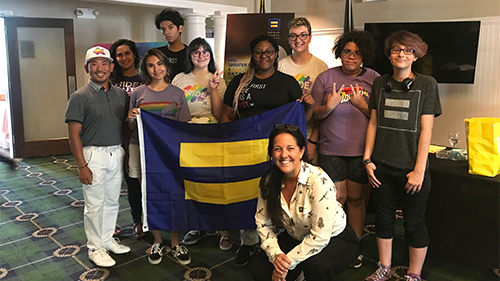
Cookies in use
Tadd Fujikawa: Golfing for Equality
by HRC Staff •
Golfer Tadd Fujikawa became the first male professional in his sport to come out as gay to help others with his visibility.
Post submitted by former Editorial Producer, Print and Digital Media Rokia Hassanein
Golfer and activist Tadd Fujikawa became the first male professional in his sport to come out as gay to help others with his visibility.
“I know that when I was struggling with my own sexuality and coming to terms with that, seeing other people sharing their truth, being authentic and sharing their story really, really helped me and gave me hope,” Fujikawa told HRC. “It made me feel that I wasn’t alone -- and that’s the main reason why I came out. I wanted to do the same thing for others and pass it on.”
Yesterday, HRC was proud to present Fujikawa with the HRC Visibility Award at a reception following HRC's 16th Annual HRC Greater NY Golf Outing in Port Washington, New York. As part of the event, Fujikawa led a golf clinic for 25 young LGBTQ people involved with the local Long Island group, Pride for Youth.
“I’m not big on awards, but this is one of those awards that I really wanted to get. Receiving it means a lot to me,” he said. “I’m thankful for everything that I’ve been given, the people who believe in me and the people I’ve touched with this.”
HRC is proud to recognize the visibility Fujikawa has brought to sports, given that heteronormativity and toxic masculinity permeate many sports, especially in male leagues. Although Fujikawa says his coming out experience was “smooth sailing,” he acknowledges that because of the culture of toxic masculinity, the experience of other LGBTQ athletes could be quite different.
“People don’t realize how much it affects an athlete being LGBTQ. Just the fears of hearing the typical locker room banter can be very traumatic,” Fujikawa said. “Those are the things that I believe we need to try to work on and eliminate from the way we speak. Personally, the way I handled it was by brushing it off and moving forward, but I know people who have been very affected by this.”
These obstacles can keep LGBTQ youth from participating in sports. According to HRC’s 2017 Youth Survey, of LGBTQ youth surveyed who said they didn’t play on their school sports teams, 16% reported not feeling safe participating in sports at school; 20% didn’t feel they would be accepted on their team because they are LGBTQ; and one in 10 transgender and gender-expansive youth didn’t participate because their coaches, teachers and administrators said they couldn’t because of their gender identity.
During his clinic with youth, Fujikawa said he wanted to inspire the young athletes to be their authentic selves while playing sports. As part of the event, Fujikawa held an hour-long discussion with the youth about his experience, the importance of coming out and visibility.
“If I can inspire them and empower them to be more of themselves and that it’s okay to be who you are and that we deserve that and we owe that to ourselves…be yourself, be authentic, be vulnerable, be able to share your true self with the world,” he said. “In my experience, that’s been one of the most authentic things that I have been able to do. It may sound simple, but it can be scary sometimes. If I can leave people with some sort of positivity about that aspect, I can be very happy.”
HRC is proud to honor Fujikawa for the visibility he brings and the work he’s doing to make sports more LGBTQ-inclusive.

- Topics:
- LGBTQ+ Youth
- Sports
Love conquers hate.
Image:

